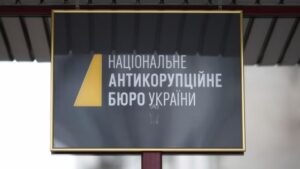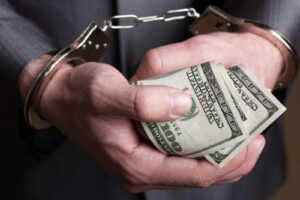
Corruption in the energy sector is systemic and long-standing. Since 2022, the National Anti-Corruption Bureau (NABU) and the Specialized Anti-Corruption Prosecutor’s Office (SAP) have been investigating five high-profile cases in the energy sector, according to anti-corruption authorities.
On Tuesday, NABU and SAP posted an infographic on criminal cases in the energy sector on their Telegram channel, which, in particular, highlights the Energoatom case with losses to the state of UAH 100 million, which is currently being considered in court, and the Ukrenergo case, with losses of UAH 600 million, which is also at the stage of judicial review.
In addition, the completion of the pre-trial investigation of the Kharkivoblenergo case, with losses to the state amounting to UAH 12.6 million, and the court’s consideration of the case of bribery by the Deputy Minister of Energy are mentioned, as well as the Energoatom case on kickbacks from contractors, which is still under investigation.
“Not just Midas: 5 high-profile cases of NABU and SAP in the energy sector since 2022,” the anti-corruption authorities said in a statement.
“The criminal organization that was exposed during Operation Midas is only part of a much bigger problem. Corruption in Ukraine’s energy sector is systemic and long-standing. NABU and SAP cases in this area cover various levels: from direct bribery in the ministry to large-scale market manipulation and theft of resources at state-owned enterprises,” NABU and SAP note.
The statement notes that anti-corruption agencies continue to consistently expose these crimes regardless of the political context or the names of those involved. “Cases are brought to court, and new challenges receive an immediate response. The work to clean up one of the most strategic and at the same time most corrupt industries will continue in the future,” NABU and SAP assure.

The National Anti-Corruption Bureau of Ukraine (NABU) and the Specialized Anti-Corruption Prosecutor’s Office (SAP) are conducting a large-scale operation to expose corruption in the energy sector, according to a report on NABU’s Telegram channel on Monday morning.
“15 months of work and 1,000 hours of audio recordings. The activities of a high-level criminal organization have been documented. Its members have built a large-scale corruption scheme to influence strategic enterprises in the public sector, in particular JSC ”NAEK “Energoatom.” Details to follow,” the message says.
A message with identical content was published on the SAP’s Telegram channel.
Earlier, the media and MP Yaroslav Zheleznyak (Golos faction) reported on searches at the home of Timur Mindich, co-owner of the Kvartal 95 studio, Minister of Justice Herman Galushchenko, and at NAEK Energoatom JSC.
Zheleznyak said that the statement on corruption at Energoatom was filed by him and his colleagues. According to the MP, “Mindyich, Herman, Energoatom — all are in our investigation and in one subsequent statement to NABU.”
Later, he wrote in a telegram that “this is not all.”

Denmark will allocate DKK 60 million (USD 8.75 million) to Ukraine to support the fight against corruption under the EU Anti-Corruption Action Program (EUACI), the Danish Ministry of Foreign Affairs reports.
Denmark has been leading the EU’s anti-corruption program in Ukraine (EUACI) since 2016. During his visit to Ukraine today, Danish Foreign Minister Lars Lekke Rasmussen announced support for the third phase of the program.
“Even before Russia’s illegal invasion, Ukraine had made significant progress in the fight against corruption, and even while the country is at war, it has managed to continue its positive development. But there are still areas that can be improved, and it is crucial for Ukraine’s EU dream that we help it achieve its goals,” the Foreign Ministry’s press service quoted Rasmussen as saying.
It is noted that the EU is contributing more than 70 million Danish kroner to the upcoming phase of the program, and Denmark is contributing almost 60 million Danish kroner.
Among other things, the program aims to promote openness and honesty in the reconstruction of Mykolaiv through close cooperation with the mayor and his team. It is planned to develop best practices for the reconstruction of Mykolaiv that can be used in other cities of Ukraine.
The ministry said that Rasmussen provided information on Denmark’s support for the EU’s anti-corruption program at today’s meeting with Ukrainian Foreign Minister Dmytro Kuleba. The two foreign ministers met in the Ukrainian city of Mykolaiv, for the restoration of which Denmark has a special responsibility.
They discussed, among other things, how Denmark and Ukraine can further develop cooperation on Mykolaiv and how Denmark can continue to support Ukraine in its fight against Russian aggression.
The Danish Foreign Minister met with students of Mykolaiv Shipbuilding University as well as the city authorities.

Ukrainian President Volodymyr Zelensky will propose to the Verkhovna Rada to equate wartime corruption with high treason, the relevant bill will be sent in the coming week.
“For me personally, the war is No. 1. Should I find more time to fight corruption? Are we going to do it? Absolutely. But I don’t have, how can I tell you, a lot of time to deal with the details, because there are really little things,” Zelensky said in an interview with Natalia Moseychuk, made public on her YouTube channel.
According to him, “if you want to fight the local paving stones, there is no way to fight the paving stones of every city.”
“There are fundamental solutions, I pay attention to them. For example, corruption. I put the task to the legislation. The legislator of Ukraine will be offered my proposals to equate corruption with high treason in wartime. And I realize that such a weapon cannot operate permanently in society. But for wartime, I think it will help,” he said.

77.6% of the polled Ukrainians believe that the president is directly responsible for corruption in the government and military administrations.
This is evidenced by the data of a public opinion poll on the adaptation of Ukrainians to life in war conditions, conducted by the Kiev International Institute of Sociology in July by order of the Ilk Kucheriv Foundation for Democratic Initiatives.
“Delaying solutions to problems that undermine people’s faith in victory will also hit the president himself. The poll showed that according to 77.6% of citizens, “the president is directly responsible for corruption in the government, military administrations,” – said the executive director of the Foundation “Democratic Initiatives” Petro Burkovsky.
As the sociologist noted, “the widespread argument that ‘the government does not have time everywhere’ does not work after 16 months of war and will no longer play the role of an indulgence for abuse, indifference and incompetence of persons who were elected and appointed precisely so that they ‘had time to do everything and everywhere’ using their powers, all the more expanded under martial law.”
“That is, it is the officials who do not fulfill their duties that are no less a dangerous enemy at this stage than Russia. And citizens expect Vladimir Zelensky’s determination to remove such individuals from power, to listen to and promote performers who honestly point out problems and competently offer solutions,” Burkovsky continued.
“Therefore, the cleansing of the TCC from “invaluable personnel” should be a starting point, not a point in the process of change in the defense sector. In this case, we should not go the way of simple solutions. In particular, we can reasonably assume that the majority of citizens may support such a “simple idea” as “transferring military offenders to the front line.” However, can we trust weapons and soldiers’ lives to people who cynically peddled certificates to evade service? It is unlikely that such a decision will be supported in combat units. But the proposal to replace corrupt officials with veterans will resonate with the public,” summarizes the political analyst.
According to the survey, 72.9% of Ukrainians support the dismissal of wounded military personnel from the ranks of the AFU with the payment of all due compensation for treatment and rehabilitation, and 46.3% – transfer at will to positions in military commissions instead of current employees.
All-Ukrainian survey “Public and Political Attitudes of the Population of Ukraine” was conducted by the Kyiv International Institute of Sociology in July 2023 at the request of the Foundation for Democratic Initiatives. The survey was carried out by the method of personal interviews using a tablet. Donetsk and Luhansk oblasts were immediately excluded from the sample due to security issues. Kherson region was initially included for calculations, but due to security issues the task for Kherson region was implemented in the neighboring Mykolaiv region.
A total of 2011 interviews with respondents living in 135 localities of Ukraine were conducted as part of the study. Under normal circumstances, the statistical error of the sample does not exceed 3.3%

A heated debate has erupted in Ukraine over claims that the fight against corruption is used to compromise influential business people who support government reforms, The Guardian has reported.
According to the authors of the article, the recent high-profile corruption investigations into the activities of the former head of Naftogaz Andriy Kobolev, ex-general director of Boryspil airport Yevhen Dykhne and former infrastructure minister Andriy Pyvovarsky may raise broader doubts about Ukraine’s domestic political situation and its ability to effectively use billions of European funds to recover from the war.
These concerns have been expressed to the U.S. State Department and the British Foreign Office, and are shared in part by Ukrainian anti-corruption campaigns.
At the same time, the article notes that the issue of corruption in Ukraine is diplomatically sensitive, as the situation could be exploited by Russian propaganda in its own interests. In particular, this could involve such Russian narratives as the hyperbole of corruption in Ukraine or the promotion of theses that anti-corruption institutions, in the creation of which Western allies and Ukrainian civil society played a major role, are “off the rails.”
“Corruption has long been Ukraine’s Achilles heel, with the country making little progress, rising slowly on Transparency International’s Corruption Perception Index from 142nd in the world in 2014 to 122nd in 2021. Despite this, critics argue that some investigations have not focused on genuinely corrupt people, but instead have focused on businessmen who came into government to help revive Ukraine’s economy after the 2014 revolution. The question at stake is what kind of economy Ukraine will become after the war – and whether talented people will risk working for the state again,” the article stresses.
The Guardian cites the opinion of Transparency International Ukraine representative Kateryna Ryzhenko, who called, in particular, for reviewing the work of the Anti-Corruption Bureau of Ukraine.
“This is a good sign that, despite the war, the anti-corruption ecosystem is not afraid to pursue ‘big names’ and to achieve a transparent review of these cases by independent judges. However, these cases have highlighted serious problems in the work of Ukrainian anti-corruption bodies,” The Guardian quoted Ryzhenko as saying.
Also referring to an unnamed Ukrainian ex-official who “participated in the campaign to create anti-corruption bodies in Ukraine,” the authors of the article write that the officers of these bodies seem to prosecute people for violations of corporate governance rather than outright corruption.
The article also discusses various factors which, according to the authors, may cause ambiguity in the anti-corruption segment. In particular, it notes that some critics accuse Ukraine of being overzealous, driven by a desire to show the EU a positive outcome before the possible accession negotiations next year. Others accuse Ukrainian anti-corruption agencies of ineptitude or a punitive mentality that is “still shaped by Soviet mistrust of profit.
The article quotes Andriy Kobolev as saying that “there is an attempt by some to discredit Ukrainian reformers – and, by extension, the anti-corruption bodies themselves.”
The article also discusses details of the trial of Kobolev, who, according to the authors, “faces 12 years in prison if found guilty of allegedly misleading Naftogaz board members by forcing them to pay him a huge bonus in 2018.”
This cites both the position of the prosecutor’s office, which argues that the payment violated a decree limiting the bonuses of state-owned enterprise managers and accuses Kobolev of misleading the Naftogaz board, and Kobolev himself, who denies any wrongdoing, stating that he warned the board about the decree, but an independent legal adviser said that the board had the exclusive right to decide on bonuses.
The article cites Kobolev’s counterargument that “the size of his bonus was determined not by him, but by the supervisory board. It goes against all the rules of corporate governance when the head of a company determines his own remuneration,” as well as the opinion of Claire Spottiswood, a former British gas regulator and former chair of Naftogaz’s supervisory board, who said that the board unanimously approved the bonus after receiving legal advice. In a statement she signed along with two other former supervisory board members, Spottiswood said that “it was a brave act of leadership on Kobolev’s part to take on an astoundingly successful case” that many thought was unwinnable. She also claims that she “never gave an interview to the NABU.”
Mark Savchuk, head of the civilian body that oversees the agency’s anti-corruption work, also criticized the NABU, telling the Kyiv Post newspaper, “The Ukrainian company received $4.6 billion, so no damage was done. These additional funds were then invested in Naftogaz’s infrastructure or paid to the state in the form of dividends. To say that the person who achieved this did it in a corrupt way is strange. In my opinion, the law enforcement agencies are making a mistake”.
Although, as the authors of the article acknowledge, Kobolev’s award “may be morally questionable,” they also appeal to the fact that “during his time at Naftogaz, he transformed the company from a failure into one that provided 15 percent of all Ukrainian state revenue,” and that “after the war began, he used his knowledge of the Russian gas industry to push for tougher sanctions against Moscow, as acknowledged in a letter written in his defense by John Herbst, the former US Ambassador to Ukraine.”
In addition, according to The Guardian, Kobolev is “not the only businessman caught up in this conflict. The second court case cited in the article is the case of Yevhen Dykhne, who, according to the authors, “was sentenced to five years in prison for leasing premises at Boryspil airport to private businesses, such as stores and cafes, without using the state competitive selection process, which would have taken two years.”
The article notes that Yevhen Dykhne himself “did not receive any personal benefit, but the court ruled that only the state has the right to lease the property and calculated that Dykhne’s actions resulted in a loss to the state of 15.7 million hryvnia.” Dykhne himself calls his verdict “worthy of Kafka.
The third high-profile trial mentioned in the article was the case of former Minister of Infrastructure Andrei Pivovarsky, who, according to the authors, “is accused of depriving the state of $30 million by deciding in 2015 that only half of the port fees at the Yuzhny seaport on the Black Sea should go to the Ukrainian Sea Ports Authority.
At the same time, the article quotes Pivovarsky himself as saying that the other half should go to private companies on the condition that they would reinvest the money received in maintenance and that his goal was to make the port more efficient.
The Guardian also notes that Pivovarsky was in charge of deregulating the Ukrainian economy at the time, and according to him, he notified the Justice Ministry about the reforms. He is not accused of receiving private benefits, but the NABU insists that only a state-owned company has the right to collect port fees.
The newspaper also quotes Pivovarsky’s recent Facebook post: “Only now I realized the price of my sincere desire to change the country for the better. I apologize to my wife and children for what they have gone through with me.”
Finally, The Guardian notes that the NABU “did not respond to a request for comment for this article.”
However, it notes that “critics (of the anti-corruption bodies – ed.) admit that some businessmen walk a fine line between showing initiative and abuse of office. But they warn that Ukrainian prosecutors distort the essence of financial crimes”.
“If someone doesn’t figure it all out, Ukraine may find that it gloriously won the war, and then find that it lost the world,” the authors of the article state.
On May 18, the Supreme Court of Ukraine started considering the appeal of the ex-general director of Boryspil Dykhne against the court’s sentence of five years in prison.